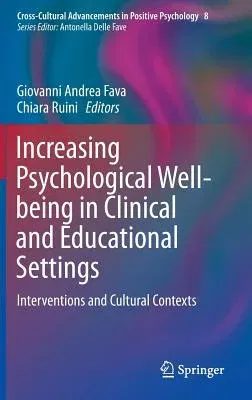The volume deals with strategies aimed to increasing psychological
well-being both in clinical and non-clinical settings, with a special
focus on the impact of cross-cultural influences on these processes. A
neglected aspect in psychotherapy research is the fact that a single
approach may not be suitable for everyone even within a cultural
context. Cultural diversity may mean having more models available for
the individual patient, or some models and dimensions of well-being
being more salient according to the cultural background. Promoting
well-being in Eastern individuals means focussing more on their positive
interpersonal relationship, sense of interconnection and contribution to
the society; whereas for a Western individual reaching autonomy and
independence and realizing one's inner potential could be much more
important. The book will be organized into two parts: the first one will
deal with individual psychotherapy/positive interventions in various
clinical domains, which will be rooted in specific cultural frameworks.
The second part of the book will deal with the promotion of well-being
in children and adolescents. This part will encompass interventions also
in non-clinical contexts, such as schools, institutions and educational
settings. A particular emphasis will be given also on preventive
approaches, once again where cross-cultural differences play a crucial
role. There are countries where interventions are focussed on the
positive integrations of immigrant individuals (i.e., European countries
such as Italy, Germany and Spain, or Australia), whereas other countries
have already faced these issues some years ago (i.e., USA, UK, France)
and strategies for improving well-being rely more on positive emotions,
emotional intelligence and positive learning processes. Another aspect
which will be covered in this volume is on promoting resilience in high
-risk young populations (e.g., youth from divorced families, or in the
child welfare system).

